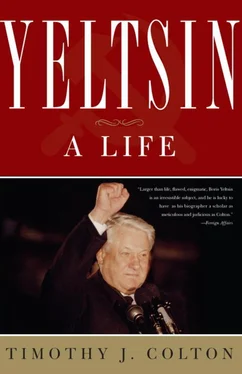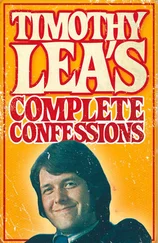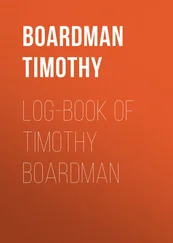A decade and a half after dekulakization, the Yeltsin house, which is still in use, was palpable betterment, and it spoke well of the esteem Nikolai was earning in the urban world. Ironically, it also re-created the rural ambience the family had lost and felt the need of. Grandfather and grandmother Starygin having moved in, the three generations cohabited, much as they would have in the Russian village, where they would have shared a house or lived within walking distance. Out in the yard were a woodpile, a vegetable garden, some poultry—and the small steambath Boris built for Vasilii Starygin in 1949. But the village continued to tug at the family’s heartstrings. In 1955 Nikolai was asked to act as chairman of a Urals collective farm—in the village of Urol, Molotov oblast—during an all-USSR campaign to recruit urban specialists for positions in the agrarian economy. He accepted, but the experiment failed, and he took back his technical job in the Sevuraltyazhstroi construction trust in two months. 10In 1959 he was sent to represent the trust at the USSR Exhibition of Economic Achievements, the trade fair and amusement park in Moscow lorded over by Vera Mukhina’s steel statue of a brawny male worker and a peasant woman holding aloft a hammer and a sickle. When he received the invitation to the capital, which he had never laid eyes on, he could not believe his good fortune: “He read it out, grabbed his head, and bounded off to the office [to check it], although by the standards of those years he cut a figure that corresponded [to the honor].” 11But the bright lights were not really for him. In 1962 Nikolai was to take a pension and, after a thirty-year absence, to repatriate to Butka with his wife, turning the wheel full circle. Klavdiya’s aging parents made the move with them. The sale of the Berezniki home allowed them to purchase a cozy cabin at 1 Korotkii Lane with cash. 12
The family’s mores were rooted in communism and in the austerity of the Urals countryside and of their Old Believer and Russian Orthodox forerunners there. While Klavdiya was “devoutly religious” from first to the last, the Yeltsins, in the land of official atheism, were not observant. Churchgoing was impossible in Berezniki, as the only Orthodox temple, the Church of the Beheading of John the Baptist, was closed by the government in 1937 and did not open again for worship until 1992. Valentina Yeltsina, unlike her brothers, was not christened as a babe in 1944. A layman could have administered the sacrament, or the Yeltsins could have gone to a village church outside of Berezniki, but they took neither option. The living room of the home had no icons on display, although the Starygins did keep icons in their bedroom and Klavdiya Vasil’evna prayed before a miniature icon she hid from prying eyes. 13Boris grew up with no religious beliefs and developed a regard for Christianity only in the 1980s and 1990s. 14
Nikolai and Klavdiya, she said in 1991, two years before her death, agreed that it was a big job “raising a good person who does not run around the streets like a waif or come into bad company.” 15None of the siblings smoked, played cards or dice, used smutty language, or touched liquor. Any trespass on this code would have been condemned in the classroom as well as in the home. Teachers at the schoolhouse where Boris studied after the war would order the pupils to shun for an entire month any pupil with the odor of tobacco on his or her breath; for the smell of alcohol, the penalty was a one-week suspension from classes and a stern note to the parents. At the age of sixteen, Yeltsin intercepted another adolescent in the act of buying a glassful of vodka at a roadside stand; he prudishly poured the liquid on the sidewalk, paid the vendor for it, and walked off. Unlike cigarettes, gambling, and swearing, drinking was one thing in which he would indulge in later life. His old classmate Sergei Molchanov, who lived in Berezniki until his death in 2006, was sure that the first alcohol that Yeltsin ever touched was the glass of champagne he was given to sip at his secondary-school graduation party in 1949. 16
The growing boy had his mother’s square physiognomy. To her, whom he had all to himself during Nikolai’s interlude in the Gulag and then frequent stays at construction jobs, were his warmest attachments. “My mother,” he said in a judgment echoed by everyone who knew her, “was a very kind woman, tender and caressing.” “I… loved her considerably more than my father,” he added. 17In disposition, Boris Yeltsin always stressed how much he took after the man of the house: “My father’s character was gruff [krutoi], like my grandfather’s, and I suppose this was passed on to me.” The context indicates the grandfather referred to here is Ignatii Yeltsin (Nikolai’s father), but Vasilii Starygin (Klavdiya’s father), whom Boris Yeltsin knew far longer and better, did not give up much to Ignatii in the gruffness department. In the late 1940s, he was “an imposing codger with a long beard and an original mind,” Yeltsin wrote, and as “unregenerate and obstinate” as they come. 18In a press interview on turning seventy-five in 2006, Boris Yeltsin attributed “my emotionalism and explosive character” to Starygin: “This was inborn. It was handed on to me from my grandfather [Starygin]. My grandmother was afraid to cross him.” 19
Between father and son, Nikolai and Boris, bullheadedness on both sides and a rivalry for Klavdiya’s affection, aggravated by Nikolai’s absences, by his binge drinking, and by the wide spacing of the children, made for a fraught relationship. In his first memoir volume, Yeltsin tells of Nikolai strapping him with a leather belt and of the arguments this kicked up between his parents. He would endure it mutely—and his father for his part would also say nothing—until his mother, “my constant protector,” came to the rescue and shooed Nikolai away. 20In one theory about the beatings, Yeltsin’s submission is said to point to masochism in his makeup. 21It is a cockamamie theory: Russian peasant boys took corporal punishment without a murmur; girls could cry, but not boys. Yeltsin took no joy in it and finally pushed back. At fourteen or fifteen, he demanded that Nikolai refrain from pummeling him and leave him in charge of his own character formation. “We are not in the time of the tsars,” Klavdiya remembered him saying to his father, “when it was all right to thrash people with birch rods.” It was then that Nikolai stopped the beatings. 22There is no way to know how often these whippings were administered or at what age they began. Boris Yeltsin’s account says his father brought him into the bedroom, closed the door, and laid him on the bed as he pulled out the strap. This would have had to be in the family house, built in 1944, since in the barracks they had only one room. One might infer from this that the punishment did not begin until the boy was around the age of puberty and did not last more than a year or two.
While the nurturing Klavdiya Vasil’evna took his side against her husband, she should not be turned into a cardboard saint. A boyhood friend, Vladimir Zhdanov, told a reporter in 2001 that Auntie Klava, as the local children called her, had teeth beneath the smile and did not coddle her son: “She was very strong-willed and strict…. [He] could not disobey her on anything. If she said, ‘Do your lessons,’ he sat right down and did them.” 23The mature Boris was to take a similar stance toward non–family members subordinate to him.
Nor did everything with Nikolai Ignat’evich have a sharp edge. There was an imaginative side to him, which Boris admired. Here is how he puts it in Confession:
My father was always trying to invent something. One of his dreams was to come up with an automated machine that would lay bricks. He would sketch it out, do drawings, think it over, make calculations, and then produce another set of drawings. It was a kind of phantom for him. Alas, no one has ever invented such a gizmo, although even now whole research institutes rack their brains over it. He would describe to me what his machine would be like and how it would work: how it would mix the mortar, put down the bricks, clean off the excess, and move along. He had worked it all out in his head and had drawn the general plan for it, but never realized the idea in metal. 24
Читать дальше












